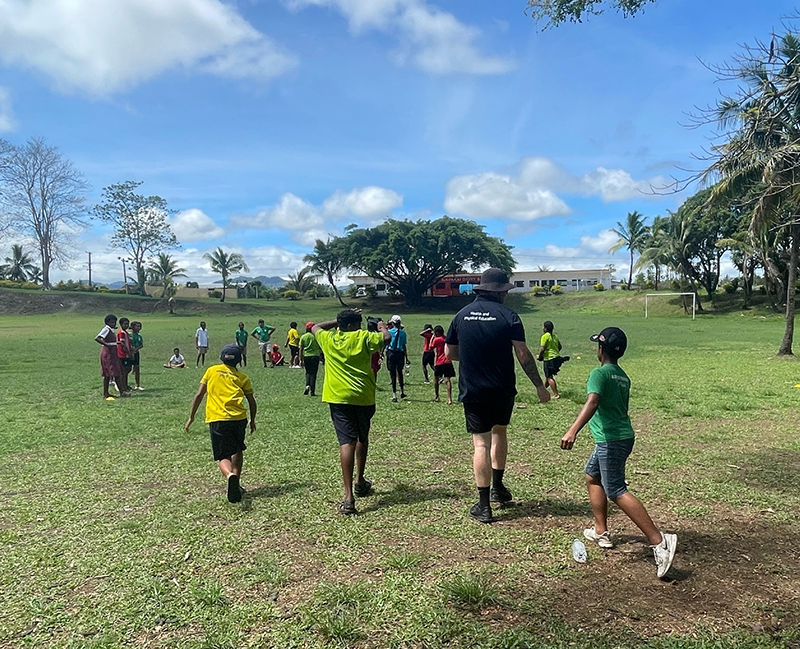Supporting Fiji’s national goals to improve population health and fitness and develop enduring community engagement in sport, a New Colombo Plan mobility project led by Charles Sturt University (CSU) has already made an impact on teachers and students through a three-month placement designed to strengthen capacity for teaching physical education in schools.
Confronting high rates of obesity and its contingent health consequences, Fiji is taking an integrated approach to tackling the issues, which includes improving education and early learning about the benefits of sport and fitness.
NCP project leader from the School of Education at CSU, Associate Professor Matthew Winslade says a range of complex reasons has contributed to the rapid rise in obesity in Fiji the past 10 years, with some 56.2 per cent of adults and 14.5 per cent of children classified as overweight.
“It’s data that is really concerning for the Fiji Government because of the implications for population health and early mortality,” Assoc Prof Winslade says.
“The data also shows the problem in Fiji impacts women more than men and people living in urban locations rather than rural centres.
“The Fijian education system, while different in style from Australia, is high quality.
“However, it operates with the challenges of high student teacher ratios, and physical education has been bundled with other subjects, such as music and arts, perhaps not giving it the focus needed to encourage generational change in fitness and good health.
“The government want to strengthen their capacity to deliver quality physical education programs that will seed healthier choices for all Fijians at and beyond their school years.”
In a country where only 20 women are qualified physical education teachers, Associate Professor Winslade says a key part of the NCP mobility project was to showcase successful and professional young women teaching physical education as role models.
Of the 18 NCP project participants who took part in the experience, 14 were women.
For Tamia Martin, a Bachelor of Education student majoring in physical education at CSU, the experience in Fiji has crystallised her passion for teaching in ways she didn’t expect.
“I feel I have grown personally but I have also learnt so much about how to adapt your teaching and the value of being an engaged teacher,” Tamia says.
“I always knew that this experience would develop cultural competencies, but it really transformed how I understood that whole idea. Before going to Fiji, I thought learning about different cultures and giving them respect was all you needed to do, but this taught me you need to go one step further for it to be valuable and meaningful for your students.
“You need to really engage with culture to have a genuine understanding of your students.”
Tamia says like most subjects in Fijian classrooms the learning is commonly related back to life.
“It is an interesting approach because the learning is contextualised for the students’ own lives at every point,” she says.
“In teaching physical education, we needed to think about how we could relate it to the sports students played in their own time. They are soccer mad, but we found there were a lot of gaps in skills education and in the way the game is played.
“It was good to be able to give them some sports education and practice designed to improve health and skills.”
Fellow NCP mobility project participant Harry Moss agrees that the placement in Fiji was transformative. Several months on he still keeps in touch with his supervising teacher from Fiji.
Harry says he has been pleased to hear the experience was also important for their Fijian teachers.
“I think having us there, bringing ideas about how to structure lessons that make a connection between physical activity and health and fitness really reinvigorated their approach to teaching physical education,” he says.
“Most sports education there revolves around established games that feed into competition sport, but we were able to engage them in everything from tag to cricket, so that they could see sports and games as part of a healthy life.
“One really positive element was the young Fijian girls’ enthusiasm for sport. We established girls’ cricket teams and in coaching them I could see how keen they were to learn more and just enjoy physical activity.
“Given the opportunity to develop new skills and new ideas about exercise and sport, I left feeling there is huge potential for education to play a significant role in turning around the obesity problem in Fiji.”
The NCP mobility program aligns closely with several international objectives including the World Health Organisation focus on Gender Equality, particularly in regions such as the Indo-Pacific, with a focus on addressing high rates of obesity and diabetes among women.
The project has also helped to forge new connections with the Fiji National University to open up opportunities to consult on curriculum design for teacher education with a focus on physical education programs. Partners in delivering the project included the Fiji Ministry of Education, Heritage and Arts, Royal Life Saving Society (AUS), Netball NZ, and Netball NSW.
In line with the United Nations sustainable development goals that through sport and physical activity, women and girls are empowered to achieve better health and psychosocial conditions, the NCP mobility project in Fiji is well on the way to making an impact.









